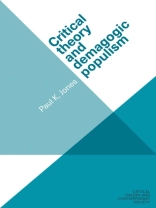Populism is a powerful force today, but its full scope has eluded the analytical tools of both orthodox and heterodox ‘populism studies’. This book provides a valuable alternative perspective. It reconstructs in detail for the first time the sociological analyses of US demagogues by members of the Frankfurt School and compares these with contemporary approaches. Modern demagogy emerges as a key under-researched feature of populism, since populist movements, whether ‘left’ or ‘right’, are highly susceptible to ‘demagogic capture’. The book also details the culture industry’s populist contradictions – including its role as an incubator of modern demagogues – from the 1930s through to today’s social media and ‘Trumpian psychotechnics’. Featuring a previously unpublished text by Adorno on modern demagogy as an appendix, it will be of interest to researchers and students in critical theory, sociology, politics, German studies, philosophy and history of ideas, as well as all those concerned about the rise of demagogic populism today.
Cuprins
Part I: Critically theorising demagogic populism
1 Introduction: from orthodox ‘populism studies’ to critical theory
2 The Institute’s analysis of ‘modern demagogy’
3 Expanding the reach of the Institute’s analysis
4 Gramscian analyses of fascism and populism: Poulantzas, Laclau, Hall
5 Towards a synthesis of critical perspectives
Part II: Populist contradictions of the culture industry
6 Cultural populisms and culture industry
7 Counter-demagogic popular art: towards a selective tradition
Excursus: an outline of Trumpian psychotechnics
8 Structural transformations of demagogic populism
Appendix: Theodore Adorno, Introduction to Prophets of Deceit
Index
Despre autor
Darrow Schecter is Professor in Critical Theory and Modern European History at the University of Sussex












